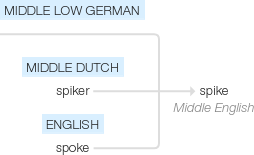Spike
Middle English: perhaps from Middle Low German, Middle Dutch spiker, related to spoke1. The verb dates from the early 17th century.
wiktionary
From Middle English spike, spyke, spik [1], from Old Norse spík(“spike, sprig”), from Proto-Germanic *spīkō(“stick, splinter, point”), from Proto-Indo-European *spey-(“to be pointed; sharp point, stick”). Cognate with Icelandic spík(“spike”), Swedish spik(“spike, nail”), Dutch spijker(“nail”), Old English spīcing(“spike”), and Latin spīca(“ear of corn”), which may have influenced some senses.
etymonline
spike (n.1)
"large nail," mid-14c., perhaps from or related to a Scandinavian word, such as Old Norse spik "splinter," Middle Swedish spijk "nail," from Proto-Germanic *spikaz (source also of Middle Dutch spicher, Dutch spijker "nail," Old English spicing "large nail," Old English spaca, Old High German speihha "spoke"), from PIE root *spei- "sharp point" (source also of Latin spica "ear of corn," spina "thorn, prickle, backbone," and perhaps pinna "pin" (see pin (n.)); Greek spilas "rock, cliff;" Lettish spile "wooden fork;" Lithuanian speigliai "thorns," spitna "tongue of a buckle," Old English spitu "spit").
The English word also might be influenced by and partly a borrowing of Latin spica (see spike (n.2)), from the same root. Slang meaning "needle" is from 1923. Meaning "pointed stud in athletic shoes" is from 1832. Electrical sense of "pulse of short duration" is from 1935.
spike (n.2)
"ear of grain," c. 1300, from Latin spica "ear of grain," from PIE *spei-ko-, from suffixed form of root *spei- "sharp point" (see spine).
spike (v.)
1620s, "to fasten with spikes," from spike (n.1). Meaning "to rise in a spike" is from 1958. Military sense (1680s) means "to disable guns by driving a large nail into the touch-hole." Figurative use of this sense is from 1823. Meaning "to lace (a drink) with liquor" is from 1889. Journalism sense of "to kill a story before publication" (1908) is from the metal spindle in which old-time editors filed hard copy of stories after they were set in type, or especially when rejected for publication. Related: Spiked; spiking.
